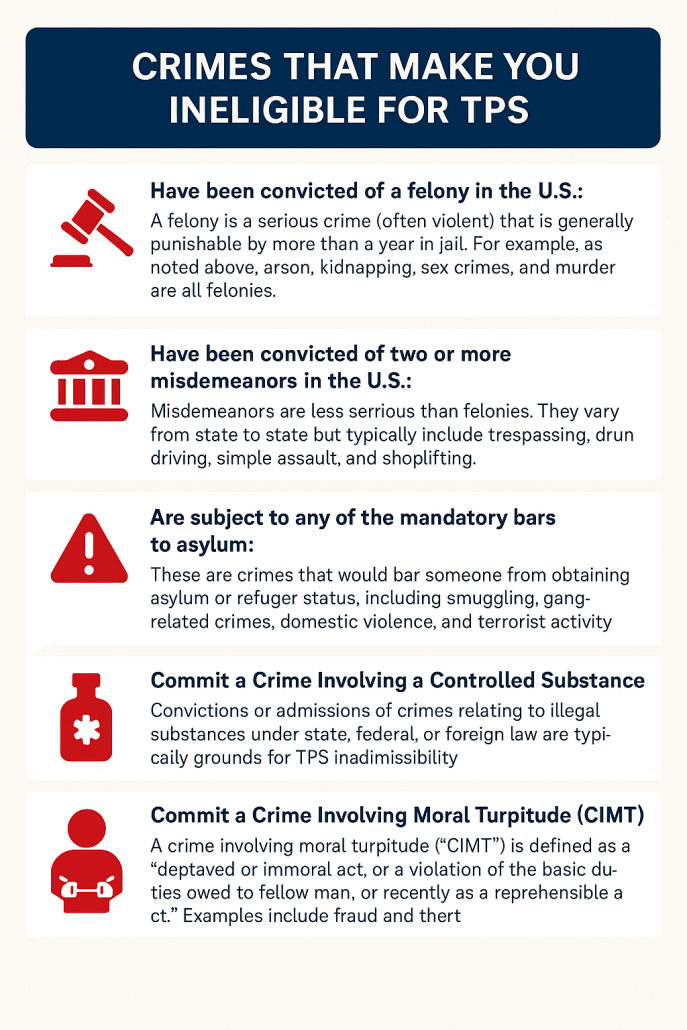What Crimes Disqualify You From TPS
If you are seeking Temporary Protected Status (TPS), specific crimes, such as murder, rape, aggravated felonies, drug trafficking, money laundering, and firearm offenses, can cause your application to be denied—or worse, trigger removal proceedings. However, not all crimes are equal under the law or the nation’s immigration policies. Felonies are treated differently than less serious crimes. While severe infractions automatically disqualify convicted individuals from TPS, other offenses may still allow you to achieve your goals of living and working in the U.S.
TPS and Criminal Offenses: What Is the Connection?
The Secretary of the Department of Homeland Security (DHS) grants eligible, foreign-born individuals TPS in cases where their home country cannot facilitate their return. TPS is generally granted in times of war, political upheaval, natural disasters, and other temporary but extraordinary situations that disrupt immigration proceedings. With TPS, an individual is not removeable or detainable based on their immigration status. They can live, work, and travel in the U.S. temporarily.
However, the DHS has guidelines to prevent individuals convicted of specific criminal offenses from obtaining TPS. DHS screens applicants to deter high-level, dangerous individuals from remaining in the U.S. and prevent them from exploiting the immigration system.
Crimes That Make You Ineligible for TPS

An individual is not eligible for TPS or cannot maintain existing TPS if they:
- Have been convicted of a felony in the U.S.: A felony is a serious crime (often violent) that is generally punishable by more than a year in jail. For example, as noted above, arson, kidnapping, sex crimes, and murder are all felonies.
- Have been convicted of two or more misdemeanors in the U.S.: Misdemeanors are less serious than felonies. They vary from state to state but typically include trespassing, drunk driving, simple assault, and shoplifting.
- Are subject to any of the mandatory bars to asylum: These are crimes that would bar someone from obtaining asylum or refugee status, including smuggling, gang-related crimes, domestic violence, and terrorist activity.
- Commit a Crime Involving a Controlled Substance: Convictions or admissions of crimes relating to illegal substances under state, federal, or foreign law are typically grounds for TPS inadmissibility.
- Commit a Crime Involving Moral Turpitude (CIMT): A crime involving moral turpitude (“CIMT”) is defined as a “depraved or immoral act, or a violation of the basic duties owed to fellow man, or recently as a reprehensible act.” Examples include fraud and theft.
Possible Exceptions
There are some exceptions to these guidelines, particularly with CIMTs. The definition is vague and leaves room for discretion. Authorities assess several factors to determine if a criminal offense bars someone from TPS. They may consider the severity of the offense, the individual’s intent or moral character, and the legal classification of the crime and its impact on immigration proceedings.
In some circumstances, a discretionary waiver may be available. Waivers generally apply to misdemeanors or cases where a waiver assures family unity or is in the public’s best interest. Immigration laws are nuanced in this regard. Skilled legal representation is the key to putting you in the best possible position to achieve TPS.
Do Not Speak with Law Enforcement Without Your Attorney Present
Anyone charged with a crime should never speak to law enforcement without their attorney present. Once they admit to committing the offense, that admission triggers grounds for inadmissibility that cannot be waived. Always wait for legal counsel to make informed decisions about your case.
However, you can challenge a disqualifying conviction. Although many crime-related impediments to TPS cannot be waived, in some cases, it is possible for someone to challenge their conviction or sentence. This is referred to as post-conviction relief. If that happens, someone disqualified from TPS for a crime may become eligible once their charges are reduced or dropped.
Call Bassey Immigration Law Center Today for More Information
Trust Bassey Immigration Law Center’s experienced attorneys for your TPS application and addressing any criminal activity concerns. With over two decades of experience, our affordable consultations in Clearwater or Tampa are tailored to your unique case.
Consult our knowledgeable and compassionate TPS Attorney for personalized guidance. Our multilingual team understands the immigrant experience, serving clients from various regions globally. Schedule your consultation today at our Tampa or Clearwater offices, assisting clients throughout Florida.
About Bassey Immigration Law Center, P.A.
Bassey Immigration Law Center, P.A., led by attorney Aniefiok Bassey, provides comprehensive immigration services to individuals, families, and businesses in Florida and beyond. With over 20 years of experience, the firm assists clients with a wide range of immigration matters, from family reunification and green cards to business visas and deportation defense. The diverse, multilingual team is dedicated to supporting clients through the complex immigration process, with a special focus on citizenship, asylum, and LGBTQ+ immigration needs. They offer affordable initial consultations and are committed to delivering personalized, strategic guidance for achieving clients’ immigration goals.



